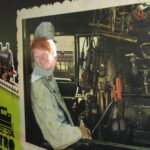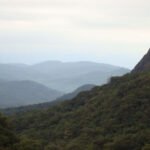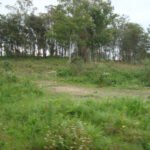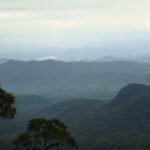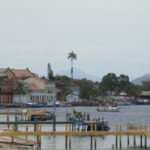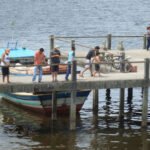Two Backpacks
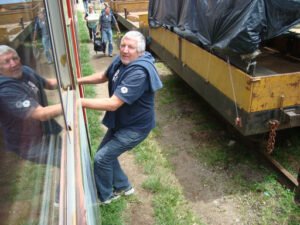
Chapter 33 - Curitiba
On our last night in Paraty, we’d got talking to a couple of travellers from England. Travelling from Argentina to Rio for their flight home, they suggested we try to avoid a stop in Sao Paolo if possible.
‘It’s a crazy city,’ they’d told us. ‘Best to just arrive and then leave again,’ was their advice.
Back in our room at the pousada, I checked the times of the bus we’d booked to take us to Sao Paolo the following day.
‘We arrive at two in the afternoon, and it looks like there’s a bus leaving for Curitiba at five. What do you want to do? Should we stay and look around the city or skip it and move on?’ I ask Ron who’s also researching bus times and destinations.
‘I don’t fancy trying to find our way around the city, especially if it’s as large and chaotic as Don and Ellie said. Let’s try for the five o’clock bus.’
I manage to book our onward transport online, and the following morning, we board the transport that will take us southwest to Sao Paolo.
We leave Paraty on time. I’m sad to leave; I’ve loved the quaint town and our oh-so-comfy pousada.
Our journey takes us along the coast, the road twisting and turning up over hills and then dropping down to small bays with white sandy beaches and crystal blue seas.
After two hours of spectacular scenery, we turn inland and begin climbing into the hills, higher and higher, the views giving us glimpses of breathtakingly beautiful rainforests and distant valleys.
Sadly, the fantastic scenery slowly gives way to the city’s outskirts. The hellish bumper-to-bumper traffic slows our progress to a snail’s pace as we negotiate our way towards the bus terminal. From the bus window, I gaze at mile after mile of houses, high-rises, and favelas. It’s a concrete jungle with not a tree in sight.
We arrive at the bus terminal on schedule and have plenty of time to find the booth for our next bus to Curitiba.
We leave on time. Our driver manages to avoid most of the traffic jams as we weave our way out of Sao Paolo. But once we’re on the outskirts of the city, the traffic builds again, and we find ourselves in a massive jam. Our progress is slow, and we finally arrive in Curitiba two hours late.
It’s one in the morning, and we’re both tired, fuzzy-headed from lack of sleep, cold, and disoriented as we stumble from the bus onto the dimly lit concourse.
‘I’ll grab the bags; you go and see if anyone around can help us find our hotel,’ suggests Ron as he steps from the bus.
I look around, wondering exactly where to go to find help. Luckily, one of our fellow passengers speaks English and offers to help.
‘Yes, I know the hotel. It’s not far,’ he tells us. ‘If you can wait a few minutes, my wife is coming to meet me. We can drive you to the hotel.
‘Are you sure? That’s kind of you,’ replies Ron, passing over the tickets for our bags to the driver, who pulls them from the hold.
True to his word, his wife arrives a few minutes later and is happy to take us to our hotel. They drop us off at the door and give us each a friendly hug before driving away.
‘That was such a nice thing to do. They were such a lovely couple. Come on, let’s get inside. I’m getting colder by the minute standing out here!’ I exclaim, picking up my backpack and entering the hotel.
Our hotel, one of the Formula 1 group, is clean and comfy, with an en suite bathroom, something we didn’t have when we’d stayed in Formula 1 hotels in France.
We’re exhausted by the journey, and it’s not long before we’re asleep.
***********
We wake to grey skies. After a filling breakfast of eggs, croissants and coffee, we decide to take a bus tour of the city.
‘It’ll give us a chance to see some of the sights, and we’ll have a better idea of what’s where,’ suggests Ron.
We book through the hotel and are picked up at the designated time, two o’clock.
When we boarded our tour bus, the sun was shining, but by two thirty, the skies have clouded over, and a chilling wind has picked up.
‘I wish I’d brought a fleece with me. I’m frozen,’ I say, turning to Ron. ‘Aren’t you cold?’
He swears he’s not and puts on the tough Scot persona, but I’m not convinced.
The tour lasts for two and a half hours, and I swear that when we leave the bus, both Ron and I can hardly talk; our teeth are chattering so much!
‘Well, that was a waste of time,’ stutters Ron as we push open the door to our hotel, relieved to find ourselves in a warm environment.
‘It wasn’t too bad,’ I reply. ‘We got to see some of the parks, museums and memorials. But I am glad to be back in the warm again.’
‘Let’s hope the train ride is better value tomorrow,’ adds Ron with a wry smile. We’d better get an early night. We’ve got to be at the station for eight fifteen.’
**********
I’d read in the Lonely Planet that the train ride to Paranagua was the best value in Brazil. So, keen to experience something different, we rise early, grab a quick bite to eat in the restaurant and then catch a taxi to the railway station and join the crowd waiting for the train.
The carriages are old and uncomfortable. I sit next to a window, and Ron plonks himself down next to me. I can already tell that he’s not happy.
‘Come on, it’s an adventure,’ I say, hoping to raise his spirits.
He gives me a watery smile and turns his attention to our fellow passengers, mostly Brazilian with a smattering of other nationalities.
Our train slowly chugs from the Curibita station. I’d expected it to pick up speed, but it maintains the same slow pace throughout our five-hour journey. We leave the city behind. Trees and dense foliage crowd the track – it’s impossible to see anything but woodland. There’s a brief glimpse of a river and, a little later, a football field in the middle of a small clearing, but most of the time, dense forest surrounds the track.
I’m becoming as fed up as Ron. The trip is not what I’d expected from the write-up in my trusty travel book.
Suddenly, the track takes a turn, and an unexpected vista reveals itself. We’re high in the mountains with hills and valleys stretching as far as the eye can see.
‘Look! That’s more like it,’ I exclaim, snapping away with my camera.
Ron grunts and closes his eyes again as our fellow passengers jostle for the opportunity to take pictures of the scenery.
The train eventually stops at a station in what looks like the middle of the jungle. Many of our fellow passengers leave the train.
‘Do you think we should get off too?’ I ask Ron, unsure as to where we are.
‘Well, the information said the train terminated at Paranagua, so I suppose we should stay on.’
It makes sense. So, we do just that and are two of only six passengers in our carriage who do the same.
After thirty minutes, the train begins its journey again, a slow, laborious journey that takes us to sea level and onto the port of Paranagua.
As we get closer to the town, we pass huge refineries and fertilizer silos that stretch for miles before the train slows its pace even further. The train driver negotiates through various sidings and rail yards until we finally reach our destination.
I’d read that Paranagua is the port for trips to Ilhe de Mel, but there’s very little to see apart from the old town, which has a few interesting buildings.
‘I’m tired, hungry and fed up,’ Ron tells me. ‘Let’s find the bus station and get back to Curitiba.’
I don’t argue. I’m disappointed in the trip, too.
We buy our tickets and settle in for what we expect to be a similar trip back to our hotel. Although the views are very similar to those we’d experienced on the train, our return journey only takes one and a half hours. Delighted, we return to our hotel, shower and rest for a while before going out for a comforting hot meal in a lovely restaurant we’ve found near the hotel.
Tomorrow, we leave for Florianopolis.
